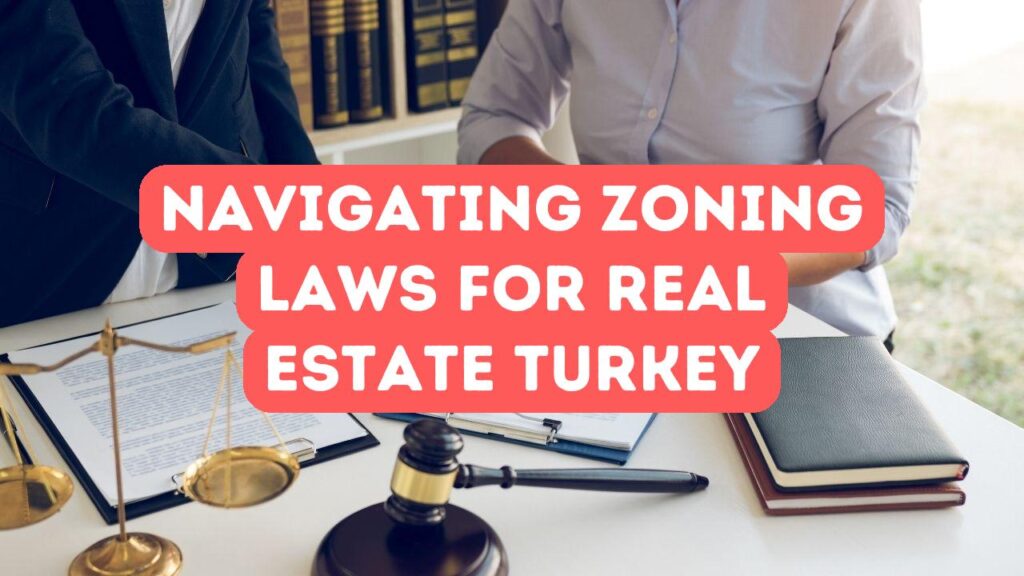Navigating zoning laws in Turkey can feel like deciphering an intricate puzzle. Turkey’s property laws and urban planning regulations are crucial for anyone wishing to invest or develop in this vibrant nation. Understanding these zoning regulations ensures that your project doesn’t hit unexpected roadblocks. Consider zoning laws Turkey as a map to your success; without it, you’re driving blind. Urban planning in Turkey is ever-evolving, often leading to shifts that could affect your property plans. This makes understanding and staying updated with zoning laws a pivotal part of the process. Navigating zoning may seem daunting, but it’s essential for safeguarding your investments. Zoning laws, much like a secret ingredient, determine how land can be used, impacting both the value and potential of your property. Familiarizing yourself with Turkey property laws will give you a competitive edge, ensuring your ventures are both compliant and successful.
Understanding Turkey’s Zoning Regulations: A Comprehensive Guide
Turkey’s zoning regulations are like an artist’s brushstroke, painting the landscape of urban development. Imagine each area in Turkey as a canvas, each with its own rules and permissions. Understanding zoning laws Turkey involves discerning these patterns to create a harmonious project. Whether you’re eyeing the bustling cityscapes or the serene countryside, comprehending these regulations is key. These rules dictate everything from residential buildings to commercial spaces. Without grasping the nuances of urban planning Turkey, you might find yourself wading through a maze of bureaucratic surprises. Diving into Turkey property laws is akin to reading a map; it reveals pathways critical for project success. It’s akin to learning a dance where each step ensures compliance, offering clarity and direction. So, with this guide, let’s simplify navigating zoning so you can focus on laying the foundation for your dreams.
Zoning laws Turkey are as layered as the country’s delicious baklava, each intricate regulation built upon another. Grasping these zoning regulations demands a blend of curiosity and attention. Navigating zoning without awareness of the specific allowance for land use can lead your project astray. Turkey property laws emphasize protection and efficiency, making them essential for both budding and seasoned investors. Urban planning Turkey shapes a project’s blueprint, determining whether you can construct that chic café you’ve been dreaming of or a serene residential complex. Be sure to examine zoning regulations closely—overlooking even the smallest detail can be akin to ignoring the ingredients in a recipe. Whether you’re intrigued by the glitzy cities or the rustic charm of the provinces, knowing these laws will serve your ventures well. Remember, getting familiar with this process is like tuning into the rhythm of a well-orchestrated symphony, guiding you from the first note to a successful crescendo.
In understanding Turkey’s zoning regulations, one must first appreciate their depth, much like diving into the vibrant hues of a Turkish bazaar. Each zoning regulation Turkey sets forth holds significant implications for property investors and developers alike. It’s a tapestry woven with threads of history, policy, and modernization—all essential to grasping urban planning Turkey. Delving into these zoning laws Turkey is akin to unlocking a treasure chest, with each rule offering clarity or challenges to your project’s pathway. The essence of these guidelines is not just to maintain order, but to encourage sustainable development. From grand commercial initiatives to cozy residencies, navigating zoning becomes your compass. Overlooking even the tiniest regulation detail could see your aspirations strained. It’s a journey where knowledge is your trusted map. In comprehending Turkey property laws, you ensure your project not only complies but flourishes in tune with the country’s progressive vision.
Key Considerations for Property Development in Turkey
When diving into property development in Turkey, zoning regulations are your first checkpoint. They’re like a user’s manual for land usage, guiding you through the maze of urban planning Turkey has laid out. To succeed, it’s imperative to grasp the zoning laws Turkey enforces to avoid any legal snags. This means delving into the Turkey property laws with a clear understanding of what constitutes compliant development. Keep in mind, these zoning laws can frequently change, so staying updated is crucial. Navigating zoning involves recognizing how different zones cater to residential, commercial, or industrial spaces. Missing these cues could lead to costly halts in your project. Always verify local zoning restrictions before laying any foundation, because getting off on the wrong foot isn’t just a setback—it’s a potential disaster. Being meticulous at this stage ensures your ambitions align seamlessly with Turkey’s vision for urban growth.
Before breaking ground on your project, it’s crucial to consider various aspects of zoning laws Turkey insists upon. Picture navigating zoning as plotting a course; every decision impacts your journey. Dive into the particulars of Turkey property laws to fully understand zoning regulations. These can differ significantly depending on the region and local government policies. Urban planning Turkey requires attention to detail, as each zone is designated for specific purposes, influencing everything from building heights to park spaces. One must weigh the implications of these laws on timelines and budgets. Also, consider public infrastructure and amenities, which can enhance or hinder your plans. Keep an eye on zoning regulations, as they shift often. Real estate developers equipped with the knowledge of Turkey’s zoning intricacies are not just building structures but creating legacies. In this dynamic landscape, being prepared isn’t just an advantage; it’s a necessity.
When undertaking property development in Turkey, understanding zoning laws Turkey is akin to possessing a key that unlocks the door to success. Begin by exploring how Turkey property laws govern land use—these are foundational to any development strategy. Navigating zoning effectively means recognizing the distinct categories within zoning regulations: residential, commercial, and industrial. It’s vital to assess how these classifications align with your project vision. Consider urban planning Turkey aspects, which might require adjustments to your initial plans. Pay attention to environmental and cultural preservation mandates, as they hold significant sway over development permissions. With zoning laws subject to frequent amendments, maintaining up-to-date knowledge is imperative. Aligning your project with these regulations not only ensures compliance but also enhances the potential for profitability and sustainability. Embarking on development without this roadmap is like setting sail without a compass—missteps could anchor your ambitions before they even set off.
Navigating Local Authorities: Essential Steps for Compliance
Navigating local authorities in Turkey is like weaving through a bustling marketplace; it requires focus and the right approach. First, fully understand the zoning laws Turkey enforces, as these rules dictate land use and development limits. Without this, you may face significant hurdles. To comply seamlessly with Turkish local authorities, familiarize yourself with the zoning regulations that could affect your project. Engage directly with municipalities since urban planning Turkey can vary greatly between regions. This means that what applies in Istanbul may differ in Ankara. Seek guidance from experts well-versed in Turkey property laws to illuminate any complexities, saving you headaches down the line. Collaboration and clear communication with local officials will smooth your path. It’s as essential as having the right map before a journey. Properly navigating zoning ensures your venture takes off without a hitch, aligning with local norms and maximizing your project’s potential.
Engaging with district municipalities is an art that requires finesse and strategy. To successfully navigate zoning and ensure compliance, initiate dialogue as early as possible. They’re the gatekeepers of zoning laws Turkey mandates, and their approval can make or break your development plans. It’s wise to approach them armed with comprehensive knowledge of both national and local zoning regulations. Document everything meticulously—this is your insurance policy against potential missteps. Do remember, zoning laws can vary significantly depending on the area’s specific urban planning Turkey has in place. Turkey property laws often come with nuanced rules, so staying informed is crucial. Consider enlisting a local consultant who understands the intricate dance of zoning regulations and can guide you seamlessly through the process. Those adept in this practice testify to its importance. Open communication, patience, and thorough preparation pave the way for smoother approvals and overall success.
Understanding the hierarchy within local municipalities is key, much like learning the steps of a traditional Turkish dance. This means identifying the right department or official responsible for zoning regulations in your area of interest. Initiate contact with the urban planning Turkey division early, as delays can result in setbacks. Tap into Turkey property laws resources available through local government offices or reputable online platforms, which often outline basic zoning regulations. If your aim is compliance, a proactive approach is your ally. Keep records of all communications and submitted documents—your way of warding off unexpected complications. Remember, zoning laws in Turkey are like the unpredictable Bosphorus currents; they require patience and dexterity to navigate. Seek advice from seasoned professionals familiar with local procedures to stay ahead of obstacles. These essential steps can turn the intricate process of navigating zoning into a calculated strategy, ensuring your project aligns with established regulations.






